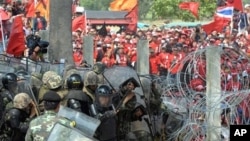Thai protesters are stepping up their campaign to force the government to call new elections. Despite declaring a state of emergency, deploying thousands more security personnel, and using tear gas against some demonstrators, Thai authorities say they will not use force to end the protests. Political analysts urge the two sides to return to negotiations.
What started weeks ago as a legal demonstration, coordinated with the government to minimize traffic disruptions, has turned into increasingly bold civil disobedience.
Since April 3, thousands of red-dressed demonstrators have occupied a central commercial district, blocking intersections and forcing businesses to close their doors.
A small group Wednesday forced their way into the parliament building, sending government leaders fleeing by helicopter.
And, on Friday riot police used tear gas in a failed attempt to keep protesters from breaking into the grounds of a satellite relay station. After talks, the government agreed to cancel its order shutting down an opposition satellite TV network, and the protesters began to leave the facility peacefully.
As part of emergency measures, authorities have deployed an additional 30,000 security personnel around Bangkok. Officials say the risk of violence is getting higher.
Panitan Wattanayagorn, a government spokesman, says they are seeking the arrest of protest leaders but will act cautiously and not use force against the demonstrators.
"We do not seek confrontation. We do not want to create conditions for instability. At the same time we would like to proceed forward with the implementation of the laws. These two will be weighed accordingly," said Panitan Wattanayagorn.
The red shirts, as the protesters are known, are mainly from the countryside. They demand that Prime Minister Abhisit Vejjajiva step down and call new elections within two weeks.
They say his government is illegitimate because it came to power through legal and political wrangling rather than popular vote.
The government says it will call elections in nine months if rules of conduct can be agreed. Red shirt leaders have dismissed the offer.
Political analysts say the escalation could lead to more serious clashes, but note that both sides are trying to avoid violence.
"So, I think both sides also concerned that they do not want any more intervention or any more coups," said Naruemon Thabchumpon, a lecturer on politics at Bangkok's Chulalongkorn University. "And, in order to prevent any intervention of the extra-parliamentary force, you might have to use the non-violence process. And, in my opinion, at least this is the new learning of the Thai society."
Many of the red shirts support former Prime Minister Thaksin Shinawatra, who was ousted by the military in 2006 despite being popularly elected twice. He now lives in exile to avoid a jail sentence for corruption.
Two successive governments friendly to him were brought down by politically charged court rulings and protests by yellow-dressed demonstrators supported by Thailand's traditional ruling class.
They occupied Bangkok's airports for a week, costing the country billions of dollars, but their leaders have yet to face justice. Some of them are in the current government.
The red shirts have followed similar tactics in their protests and hope through them their leaders can regain power.
"They want the new power to come in, they want to change all sort of laws, they want to change the regime, and make sure that they can whitewash Thaksin Shinawatra and he can come back in power again," said Surat Horachaikul, a political science professor at Chulalongkorn University.
Naruemon Thabchumpon says the stalemate has distracted from the real concerns the protesters have. She says the red shirts are from informal parts of the economy that have been largely overlooked.
"The politics and the economic policy of the government have not yet reached them. So, that's why they come out as a frustration," she said.
Optimistically speaking, she says at least the protests have brought the issues to the surface. She says it is a problem of Thai society that people have to create a disturbance for their voices to be heard.
A group of Thai academics has urged the protesters and authorities to return to the negotiating table to settle the issues peacefully.




